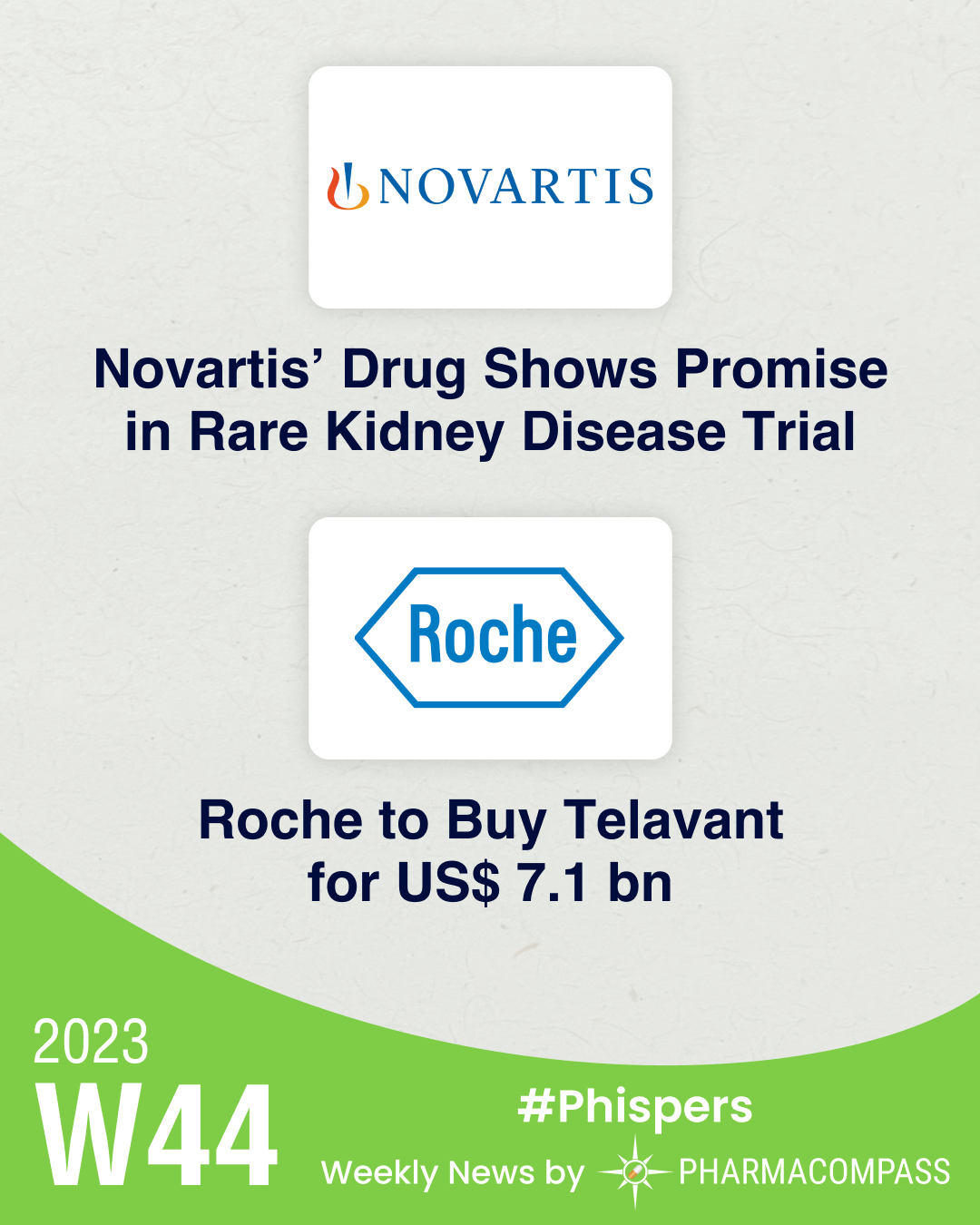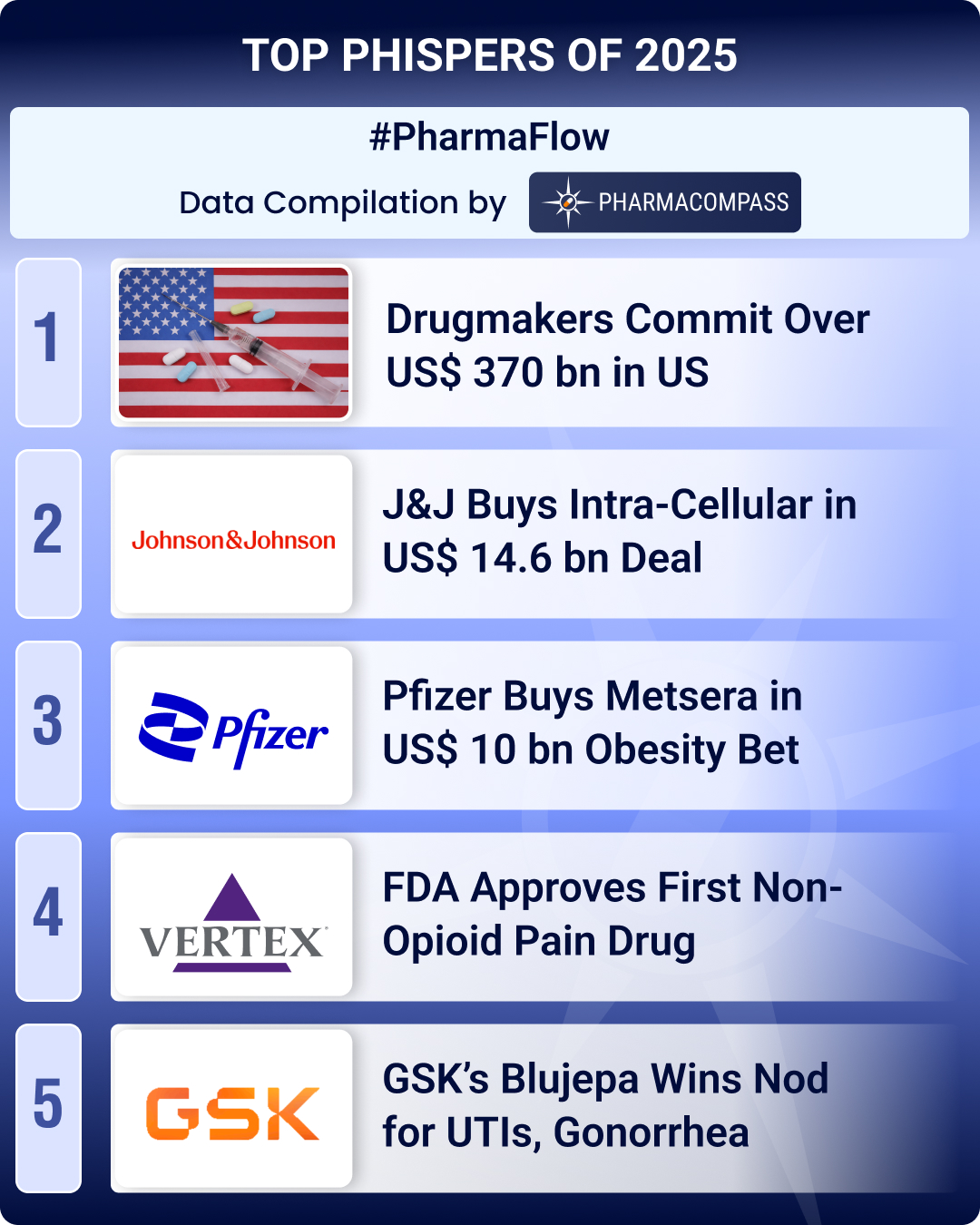
By PharmaCompass
2023-11-02
Impressions: 1,277 Article || 4 Video
During the last fortnight, the biopharma world saw two big deals — Roche’s US$ 7.1 billion acquisition of Telavant and Merck’s US$ 4 billion deal with Daiichi Sankyo to develop Daiichi’s three cancer candidates.
The tempo continued over the last few days. GSK has entered into a US$ 1 billion deal with Johnson & Johnson to gain exclusive rights to further develop and commercialize its hepatitis B therapy. And AstraZeneca has invested US$ 245 million in clinical-stage biotech Cellectis to accelerate therapeutic development in immunology, oncology, and rare diseases.
In approvals, the US Food and Drug Administration (FDA) has approved Eli Lilly’s Omvoh (mirikizumab-mrkz) infusion injection for moderate to severely active ulcerative colitis, and Novartis’ Cosentyx has been approved to treat moderate to severe hidradenitis suppurativa. Genentech, a unit of Roche, has also gained FDA approval for Vabysmo to treat macular edema following retinal vein occlusion.
In clinical trials, Novartis’ experimental drug atrasentan has shown promise in a late-stage interim analysis by significantly reducing elevated protein in the urine in IgA nephropathy, a rare kidney disease. Eisai and Biogen shared interim data for its blockbuster Alzheimer’s drug Leqembi that demonstrates how its investigational subcutaneous (SC) version is as effective as the intravenous (IV) one.
And FDA has issued a warning against the use of 26 over-the-counter (OTC) eye drops, which includes brands from CVS Health Corp and Cardinal Health brands, citing risks of eye infection and possible vision loss.
GSK buys exclusive rights to develop J&J’s hepatitis B therapy for US$ 1 billion
GSK has agreed to pay Johnson & Johnson about US$ 1 billion in exchange for exclusive rights to further develop and commercialize its hepatitis B therapy — JNJ-3989. The experimental therapy was originally developed by Arrowhead Pharmaceuticals and licensed to J&J’s Janssen in 2018. These exclusive right to JNJ-3989 may fuel expansion of GSK’s own hepatitis B treatment (bepirovirsen), which is in late-stage development.
AstraZeneca to invest US$ 245 million in Cellectis: AstraZeneca has agreed to invest US$ 245 million in a clinical-stage biotechnology company Cellectis in order to speed up the development of therapeutics in areas such as immunology, oncology and rare diseases. This deal gives AstraZeneca exclusive rights to 25 genetic targets, out of which 10 can be explored for development.
Roche buys Telavant: Last week, Roche agreed to buy Telavant for an upfront amount of US$ 7.1 billion, along with potential milestone payments of US$ 150 million, in order to gain access to its new inflammatory bowel disease drug — RVT-3101.
Merck in deal with Daiichi: Merck has agreed to pay Daiichi Sankyo US$ 4 billion upfront in addition to US$ 1.5 billion in continuation payments over the next 24 months to co-develop Daiichi’s three cancer drug candidates — patritumab deruxtecan, ifinatamab deruxtecan and raludotatug deruxtecan. The deal could bring in up to US$ 22 billion for Daiichi, depending on the success of the cell-targeting therapies.
Lilly’s bowel disease drug bags FDA nod for treating ulcerative colitis
FDA has approved Eli Lilly’s drug, Omvoh (mirikizumab-mrkz) infusion injection, making it the first and only interleukin-23p19 antagonist for the treatment of moderate to severely active ulcerative colitis (UC) in adults. Omvoh is one of Lilly's potential growth drivers for this decade alongside tirzepatide for obesity, lebrikizumab for atopic dermatitis or eczema and pirtobrutinib for cancer.
Merck’s Keytruda approved to treat biliary tract cancer: Merck’s Keytruda has bagged FDA approval for sixth gastrointestinal cancer indication. This week, it got approved to treat locally advanced unresectable or metastatic biliary tract cancer, combined with the chemotherapies gemcitabine and cisplatin. The approval was based on the results of a phase 3 trial.
FDA okays Novartis’ Cosentyx for hidradenitis suppurativa: Novartis has received FDA approval for Cosentyx (secukinumab) to treat moderate to severe hidradenitis suppurativa, a long-term painful skin condition that causes abscesses and scarring on the skin in adults. This approval makes it the first FDA-approved fully human biologic for the indication in nearly a decade.
Roche’s Vabysmo approved for treating retinal vein occlusion: Genentech, a unit of Roche, has secured FDA approval for Vabysmo to treat macular edema following retinal vein occlusion (RVO), a common vascular disorder of the retina. RVO is the third indication for Vabysmo, along with wet age-related macular degeneration and diabetic macular edema.
Pfizer secures FDA nod for new meningococcal vaccine: Pfizer’s meningococcal vaccine, Penbraya, has received FDA approval, making it as the first shot to protect against five meningococcal groups—A, B, C, W, and Y—in individuals aged 10 to 25 years. Penbraya merges elements found in two of Pfizer’s meningococcal vaccines, Trumenba (for meningococcal group B) and Nimenrix (targeting meningococcal groups A, C, W-135, and Y through a conjugate vaccine).
Novartis’ atrasentan shows promise in treating rare kidney disease
Novartis’ experimental drug atrasentan has shown promise in a late-stage interim analysis by significantly reducing elevated protein in the urine of patients with IgA nephropathy (IgAN) or Berger’s disease, a rare kidney disease. With these results, Novartis is seeking accelerated approval from the FDA. Novartis had acquired atrasentan through its US$ 3.5 billion buyout of US biotech company Chinook in June.
Biogen’s subcutaneous Leqembi found to be effective: Eisai and Biogen shared interim data for its blockbuster Alzheimer’s drug Leqembi, demonstrating that its investigational subcutaneous (SC) version is as effective as the current intravenous (IV) version. The SC version was able to clear 14 percent more plaque and showed 11 percent more drug concentration in the blood when compared to the IV version, with the added benefit of administration at home.
GSK’s Jemperli meets survival goal in late-stage trial: GSK’s Jemperli, in combination with chemotherapy, met the primary goal of overall survival in patients with advanced or recurrent endometrial cancer compared to placebo in a late-stage trial. Jemperli has been approved in both the US and the UK to treat some subtypes of advanced or recurrent endometrial cancer when used in combination with chemotherapy.
FDA cautions against use of 26 OTC eye drops due to risk of infection, vision loss
In the US, FDA has cautioned against buying or using 26 over-the-counter eye drops, including those from CVS Health Corp and Cardinal Health, due to potential risks of eye infection and, in severe cases, vision loss. Following findings of unsanitary conditions in the manufacturing facility, the agency has instructed the manufacturer to recall all product lots.
The PharmaCompass Newsletter – Sign Up, Stay Ahead
Feedback, help us to improve. Click here
Image Credit : Phisper Infographic by PharmaCompass license under CC BY 2.0
“ The article is based on the information available in public and which the author believes to be true. The author is not disseminating any information, which the author believes or knows, is confidential or in conflict with the privacy of any person. The views expressed or information supplied through this article is mere opinion and observation of the author. The author does not intend to defame, insult or, cause loss or damage to anyone, in any manner, through this article.”







